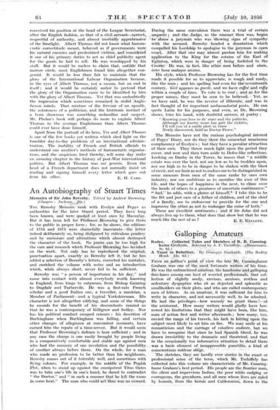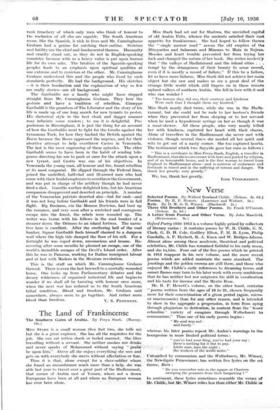Galloping Amateurs
Rodeo. Collected Tales and Sketches .of R. B. Cunning-
Name. Graham. Selected by A. F. Tschiffely. .(Heinemami. 8s. ad.). - - A Toast to Rebellion. By Giuseppe Garibaldi. (The Bodloy Head. 12s. 6d.)
FROM an author's point of view the late Mr. Curmingliame
Graham was one of the most. fortunate writers of his time He'was the enfranchised amateur the handsome and galloping
free-lance among our host of worried professionals, that col- lection of slightly seedy, envious, anxious, restless and
sedentary dyspeptics who sit as dejected and splenetic as smallholders on their plots, and who are called contemporary
men of letters. As an amateur, it was sufficient for him to write in character, and not necessarily well, to be admired. He had the privileges—how warmly we grant them !—of
the aristocrat. How many writers would gladly have bor- rowed his limitations that they might haVe been, like -him, man of action first and writer afterwards ; how many, too,
envied the range of his travels, his luck in hitting upon the subject most likely to set him on fire: We may smile at his
romanticism and the carriage of caballero andante,, but we
have to recognise that since he had Spanish blood, he was drawn irresistibly to the dramatic and theatrical, and that
in the occasionally too informative attention to detail there was a basic element of insuppressible punctilio, a kind of conscientious noblesse oblige.
The sketches, they are hardly ever stories in the exact or professional sense of the term, which Mr. Tschiffely has collected into this volume arecharacteristic of -Mr. Cunning- hame Graham's best period. His people are the frontier man, the silent and impervious Indian, the poor white cadging or
courageous, the greenhorn, and all men whose, Ryes are ruled by honour, frOm the heroic and Calderonian, down to the
rank treachery of which only men who think of honour to the exclusion of all else are capable. The South American scene, like the Spanish, is rich in lives and Mr. Cunninghame Graham had a genius for catching their outline. Stoicism and futility are the chief and fundamental themes. Humanity and cruelty stand out, as they do not in English-speaking countries because with us a heavy value is put upon human life for its own sake. The fatalism of the Spanish-speaking peoples leads to an emphasis upon spiritual qualities at one extreme and to cynicism at the other. Mr. Cunninghame Graham understood this and the people who lived by such standards perfectly. He had the background. His sketches —it is their fascination and the explanation of why so few are really stories—are all background.
The Garibaldis are a family who might have stepped straight. from Mr. Cunninghame Graham. They love the gesture and have a tradition of rebellion. Giuseppe Garibaldi is the grandson of The Liberator and the story of his life is made up of one long search for new tyrants to pester. His rhetorical style in the best cloak and dagger manner may infuriate some readers ; to me it is delightful. Pre- posterous in Birmingham, it is just the thing for an account of how the Garibaldis went to fight for the Greeks against the tyrannous Turk, for how they backed the British against the Boers because the Boers oppressed the negroes, and for their abortive attempt to help overthrow Castro in Venezuela. The last is the most engrossing of these episodes. The elder Garibaldi seems to have been in the habit of sending tele- grams directing his son to pack at once for the attack upon a new tyrant, and Castro was one of his objectives. In Venezuela the young man, all honour and fire, found rebellion at its most congenial. He slipped through the Federal lines, joined the undrilled, half-clad and ill-armed men who had come with their feudal employers to overthrow the Government, and was put in charge of the artillery though he had never fired a shot. Guerilla warfare delighted him, but his American companion disapproved and deserted on principle. A number of the Venezuelan patriots deserted also—but for cash—and it was not long before Garibaldi and his friends were in full flight. Big Business, via the Monroe Doctrine, had bust up the romance, and very soon after a wretched and courageous escape into the forest, the rebels were rounded up. The writer was borne with his fellows in the coal bunker of a steamer down the Orinoco to an island fortress. The narra- tive here is excellent. After the sweltering hell of the coal bunker, Signor Garibaldi Surds himself chained to a dungeon wall where the high tide damped the floor of his cell. For a fortnight he was roped down, unconscious and insane Re- covering after some months he planned an escape, one of the world's incredible escapes of the Devil's Island order. After this he was in Panama, working for Italian immigrant labour and at last with Madero in the Mexican revolution.
This is the stuff on which Mr. Cunninghame Graham thrived. There is even the last farewell to a mortally wounded horse. One looks up from Parliamentary debates and the dreary wilderness of organised industrial life and begins to wonder if we shall all be bursting with honour once more, when the next war has reduced us to the South American tribal condition. Blood and freedom, Mr. Graham said somewhere, always seem to go together. And rather more











































 Previous page
Previous page